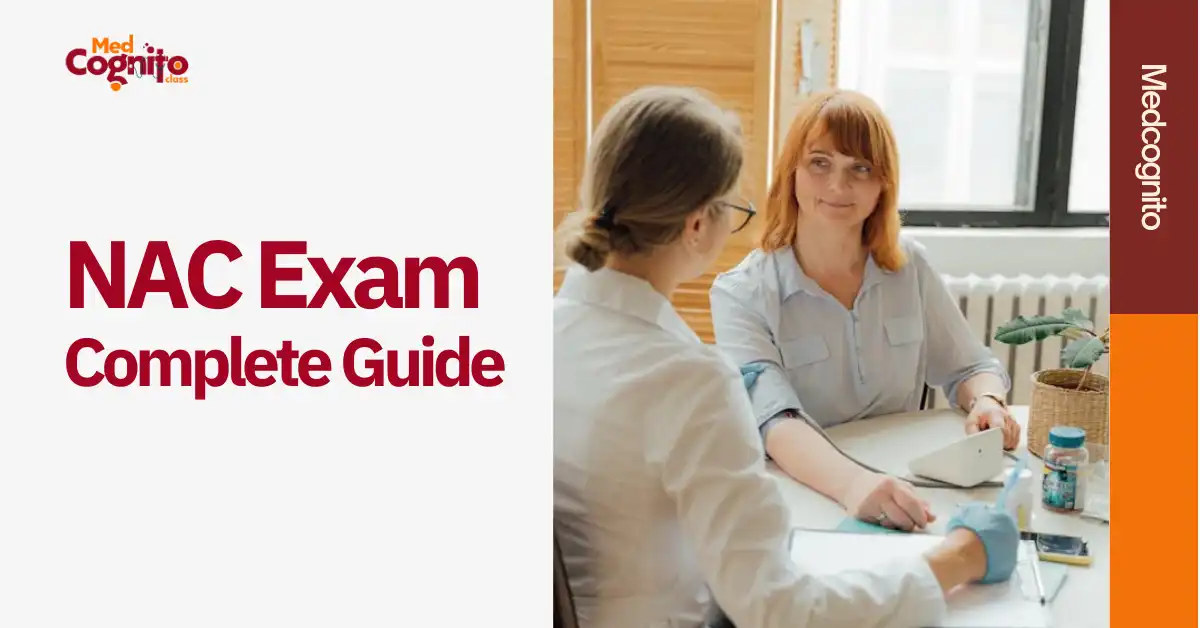If you’re an internationally trained medical graduate (IMG) looking to practice medicine in Canada, the National Assessment Collaboration Objective Structured Clinical Examination (NAC OSCE) is a crucial step in your journey.
This exam is designed to assess your clinical skills, patient interactions, and medical knowledge in a simulated hospital setting ensuring you’re ready for residency training in Canada.
But what exactly is the NAC OSCE? What does the exam entail? How can you best prepare to maximize your chances of success? In this guide, we’ll break down everything you need to know about the NAC OSCE, including the exam format, key preparation tips, and what to expect on exam day.
What is the NAC Examination?
The National Assessment Collaboration (NAC) Examination is a national exam that assesses your readiness to enter a Canadian residency program.
How is the NAC Exam taken?
The exam is administered twice a year, typically in the spring and fall, at designated test centers across Canada.
During a standard exam administration, all candidates rotate through the same set of examination stations, ensuring a fair and consistent evaluation process. Candidates have the option to take the NAC Examination in English or French at specific centers.
NAC Examination Format
The NAC Examination consists of 12 stations, but only 10 stations contribute to the final score; 2 are pilot stations used for research and exam development purposes. Each station lasts 11 minutes, with a 2-minute transition time between stations.
At each station:
- A brief written statement introduces a clinical scenario and outlines the required tasks, such as taking a patient’s history or performing a physical examination.
- Candidates interact with at least one Standardized Participant (SP), a trained actor portraying a patient.
- A Physician Examiner (PE) observes and evaluates the candidate’s performance based on specific criteria.
This structured approach ensures that candidates are assessed fairly on their clinical knowledge, communication skills, and patient interaction abilities in a real-world medical setting.
Which Areas Does the NAC Examination Test?
The NAC Examination evaluates candidates on their ability to handle typical clinical scenarios across various medical disciplines, including:
- Medicine
- Surgery
- Pediatrics
- Obstetrics & Gynecology
- Psychiatry
- Preventive Medicine & Public Health
Key Competencies Assessed
Candidates are evaluated on up to seven competencies per station:
- History Taking – Efficiently gathers relevant patient information.
- Diagnosis – Forms a logical differential diagnosis.
- Management – Discusses treatment, patient safety, and preventive care.
- Communication Skills – Uses a patient-centered approach with clear, respectful communication.
- Physical Examination – Performs an organized and patient-sensitive examination.
- Investigations – Select appropriate lab or diagnostic tests.
- Data Interpretation – Accurately interprets test results in a clinical context.
The exam content is developed by experienced physicians across multiple disciplines, ensuring it reflects the competencies expected from a Canadian medical graduate.
Who is Eligible to Apply for the NAC Exam?
To be eligible for the NAC Examination, you must be either:
- A graduate from a medical school outside Canada or the U.S., listed in the World Directory of Medical Schools with a Canada Sponsor Note indicating it is recognized in Canada.
- A student who will complete all medical degree requirements within 12 months of the exam date.
- A graduate of the U.S. School of Osteopathic Medicine.
How Many Times Can You Take the NAC Exam?
You can take the NAC Examination a maximum of three times, regardless of whether you pass or fail previous attempts. Only your most recent result remains valid indefinitely it does not expire.
You cannot take the exam in consecutive sessions. For example, if you take the exam in May 2024, the earliest you can retake it is May 2025 or later.
Where Is The NAC Exam Taken?
The NAC Examination is held twice a year at a limited number of exam centers across Canada. During the application process, you must choose up to three preferred exam centers in order of priority.
Approximately six weeks before the exam, you will receive a notification in your physiciansapply.ca account confirming your assigned exam center.
NAC Exam Session Dates
The NAC Examination is a half-day exam held twice a year in spring (May) and fall (September) at limited exam centers across Canada. Results are released approximately 8 weeks after the exam date.
Your NAC exam results are accepted by residency program directors nationwide, meaning you do not need to take the exam in the same province where you plan to apply for residency. Feel free to check out the exam dates for the 2025 NAC Exam.
NAC Exam Fees
The NAC Examination application fee is $3,255.00 and is non-refundable. If you withdraw before the deadline, you may be eligible for a refund, but a $528.00 withdrawal fee will be charged. In certain circumstances, you may still get a refund after the withdrawal deadline; however, an administration fee of $1,627.50 will apply. For important dates and scheduling, refer to the official NAC Examination website.
How to Choose the Best NAC OSCE Prep Course
A good NAC OSCE prep course should cover mock stations, exam strategies, communication skills, and medical maneuvers practice. However, the right course for you should also align with your budget, quality expectations, and timeline to ensure effective preparation.
1. Budget
Prep courses vary in price, so choose one that fits your budget while still providing high-quality training. Avoid overly cheap options that may lack comprehensive materials or experienced instructors.
2. Timeline
Consider how much time you have before your exam. Some courses offer intensive short-term programs, while others provide long-term study plans. Pick a course that aligns with your schedule and allows enough time for proper preparation.
3. Course Coverage
A good course should include mock OSCE stations, communication skills training, physical exam techniques, and exam strategies. Ensure the curriculum is aligned with the NAC OSCE format and covers all necessary competencies.
4. Quality
Look for courses taught by experienced medical professionals with strong reviews from past students. High-quality programs will offer structured lessons, realistic practice scenarios, and personalized feedback to help you improve.
By considering these factors, you can choose a prep course that maximizes your chances of success on the NAC OSCE.
Frequently Asked Questions
What does the NAC OSCE stand for?
The NAC OSCE stands for National Assessment Collaboration Objective Structured Clinical Examination.
How difficult is the NAC OSCE?
The NAC OSCE goes beyond medical knowledge; it tests clinical skills, critical thinking, and patient assessment in real-world scenarios. Success requires hands-on practice and effective decision-making, not just memorization.
What is a good score on the NAC OSCE exam?
The NAC OSCE is scored on a 500 to 700 scale, with a passing score of 577. A good score is 600 or higher.
Is the NAC OSCE pass-fail?
Yes, NAC OSCE is scored on a Pass or Fail basis. The NAC OSCE is scored on a 500 to 700 scale, with a passing score of 577. A score of 577 or above is a pass, while anything below 577 is a fail.
Does the NAC OSCE result expire?
The NAC Exam result doesn’t expire, only your most recent result remains valid indefinitely.





